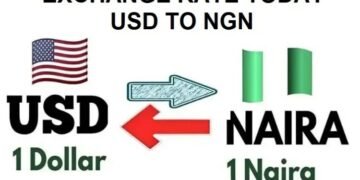Welcome to GoldenNewsNg! We have compiled the Latest Dollar to Naira Rate Update and CBN News Today 5th August 2023. so read on
The first topic on our list: Naira has Crashed to N895 per Dollar on The Black Market
Naira Hits All-Time Low of N895 to a Dollar on Black Market
The Nigerian naira has plummeted to an unprecedented low, reaching N895 to a dollar at the parallel market, also known as the black market. This significant drop has raised concerns as demand for the US dollar surged due to heightened travel and increased product imports into the country. On Thursday, August 3, 2023, the official Investors and Exporters (I&E) window saw the naira trading at N775 to a dollar.
Historic Exchange Rate Recorded on Abokifx
The foreign exchange aggregator website, Abokifx, confirmed the historic low of the naira against the dollar on Friday, August 4, 2023. Starting at N880, the naira experienced a steep decline to N895, marking the lowest value ever recorded.
Challenges in the Foreign Exchange Market
Analysis of major foreign currencies in Nigeria revealed that the demand for the US dollar remains high amid limited Forex inflows and slower diaspora remittances. These factors have contributed to the persistent scarcity and challenges in stabilizing the exchange rate.
Disparity Between Official and Parallel Markets
The situation is further exacerbated by the wide gap between the official and parallel market rates. With a difference of N120 between the two, the current exchange rate hampers the FX unification plans initiated by President Bola Tinubu.
Efforts to Stabilize the Naira
Despite the recent recovery of 6.03% on Wednesday, August 2, 2023, at the official I&E window, the overall performance of the naira in the foreign exchange market remains concerning. Addressing the issue and finding solutions to stabilize the currency will be crucial for the economic stability and growth of the nation.
Federal Government’s Policy Blamed for Naira’s Fall
Financial experts have pointed to the federal government’s policies as the primary cause of the recent depreciation of the Nigerian naira, which has reached its highest level since the government’s initiative to unify the foreign exchange markets. They caution that the widening gap between the black market and official rates could hinder government efforts to attract foreign investors.
One significant policy under scrutiny is the 2023 Finance Act, which now requires banks to obtain Tax clearance certificates from forex seekers before granting access to foreign exchange. While this measure was intended to curb money laundering, it inadvertently drives individuals without the necessary certificates to seek dollars in the black market.
Additionally, the Central Bank of Nigeria’s (CBN) ban on 43 items from accessing foreign exchange has exacerbated the demand for dollars at the black market. Experts argue that lifting these restrictions could enable importers to access foreign exchange at the official rate and help bridge the gap between the official and black market rates.
Simplifying the Process for Forex Seekers
Banker and investment analyst, Justin Iwuchkwu, suggests that the government could have adopted a more straightforward process for forex seekers by requesting easy-to-obtain identification documents instead of tax clearance certificates. This approach could have curbed the surge in demand for dollars at the black market.
CBN’s Lack of Experience in Naira Float Management
In a related development, the Economist Intelligence Unit (EIU) has expressed doubts about the Central Bank of Nigeria’s ability to effectively manage the naira float. The EIU predicts that the official exchange rate could eventually moderate at N860 to a dollar, further underscoring concerns about the government’s foreign exchange policies.
As the naira’s value continues to decline, stakeholders emphasize the need for the federal government and the CBN to reevaluate their policies and consider more strategic approaches to stabilize the currency and attract foreign investments.
CBN News Today 5th August 2023
CBN places cash withdrawal limits on commercial bank customers
CBN Increases Withdrawal Limits to Boost Financial Inclusion
In response to the widespread dissatisfaction and public outcry, the Central Bank of Nigeria (CBN) has decided to adjust its withdrawal limits for commercial bank customers, which were initially imposed during the naira redesign program in December 2022.
Initially, the CBN had restricted individuals to a weekly withdrawal limit of N20,000 and set a limit of N500,000 for corporate bodies. However, this policy faced strong opposition from Nigerians who felt the limits were too restrictive and caused financial difficulties.
As a result, the CBN revisited the policy and decided to raise the withdrawal limits significantly. Individuals are now allowed to withdraw up to N500,000 weekly, while corporate organizations can access up to N5 million.
It is worth noting that any withdrawals beyond these new limits will require written approval from the bank’s Managing Director. This measure ensures that larger withdrawals are appropriately scrutinized and approved on a case-by-case basis.
The primary objective of this adjustment is to enhance financial inclusion, particularly for the poor and rural communities. By allowing individuals and corporate bodies greater access to their funds, the CBN aims to promote economic growth and provide better opportunities for those who were previously limited by the lower withdrawal caps.
This move is expected to positively impact the overall economy by empowering more Nigerians to participate in financial activities, conduct business transactions, and achieve their financial goals. Additionally, it demonstrates the CBN’s responsiveness to public feedback and its commitment to fostering a more inclusive financial landscape in the country.
Source: GoldenNewsNg
Warning!
This Article should NOT BE COPIED (word for word), either in whole or in part (TITLE) by any blog without due permission or acknowledgment. Proper acknowledgment includes, but not limited to (a) LINK BACK TO THE ARTICLE i This content is protected by the Digital Millennium Copyright Act 1996 (DMCA). and we won’t hesitate to report any blog found wanted!


















